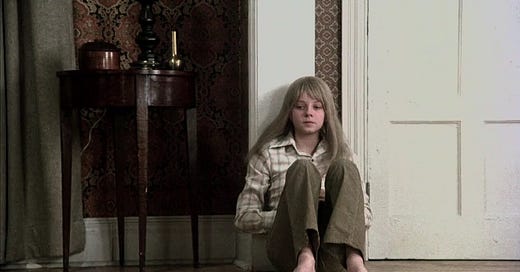It’s strange, in a way, that The Little Girl Who Lives Down the Lane inadvertently advocates for what it’s trying to expose. Even if she’s precocious, wiser than her 13 years, Rynn Jacobs is still a child and unequipped to navigate an adult world alone. Just as Jodie Foster, who made the film at 13 (the same year she did Taxi Driver) probably was.
I just saw a clip on TikTok of Drew Barrymore and Demi Lovato talking about the perils of child stardom, and The Little Girl Who Lives Down the Lane definitely made me consider the question, the exploitation of youth on camera, and why the movie still manages to be kind of really good. I’m not really here to talk ethics, despite having a an interesting conversation with a friend the other day about the necessity of child stars in an era where we can de-age and AI-ify just about anyone. Perhaps that’s for another post.
I just want to talk about the complex gem that is The Little Girl Who Lives Down the Lane, which manages to be a horror-adjacent thriller, a coming-of-age tale, and (perhaps most effectively) an earnest teen romance. It made me think a little bit about Let the Right One in, and The Little Girl Who Lives Down the Lane is also best when it narrows in on the burgeoning romance between two neglected children in a small snowy town.
I guess I’m a sucker for a movie that takes Kids Seriously. And Rynn Jacobs, who we quickly learn is only pretending that she lives with her busy poet father (he’s dead), spends a lot of time showing how us how well she manages on her own. She’s mature, friendly, assertive when she needs to be, and has effectively concocted this very involved (and maybe a little preposterous) narrative for the few adults who do question her father’s absence. Early on in the film I accepted it only because I know poets are erratic and self-centered, and it didn’t feel too crazy that a poet dad would neglect his daughter for his precious words. But anyway, that ends up not being this movie.
Rynn has been raised to believe that she’s special. And after her father found out he was terminally ill, he convinced her that whoever would be left to take care of her would dim her light. They came up with a plan in which she would have to keep this ruse up until she was old enough to legally be on her own, and she’s been living in isolation—save for a pet hamster—ever since. The only people she interacts with in this small town are a nosy, belligerent landlord, the landlord’s creepy adult son, a friendly but suspicious cop, and his polio-afflicted magician teenage nephew Mario. Mario and Rynn develop an innocent-enough attraction, rooted in their loneliness and isolation, and Rynn eventually shares her secret with him.
That, and that her landlord was accidentally killed when she panicked after discovering the body of Rynn’s abusive mother in the basement. Instructed by her father, Rynn has poisoned her mother’s tea when her mother attempted to gain custody of her. She’s matter-of-fact about this all, and the movie really makes no effort (and maybe this is also for the best) to have us question Rynn’s humanity. Mario doesn’t give her much of a hard time either. There’s an implicit understanding. We all do what we must to survive.
The more sinister plot involves Martin Sheen’s character, who lusts after Rynn. With his mother missing, he starts to suspect Rynn is up to something, and eventually puts her whole double life together. The story goes to expected places, and it’s all freaky enough, but again—Rynn and Mario are kind of what elevate the movie.
—
There’s something about being a teen and having an ally to be ~misunderstood~ with. There’s something about coming into an awareness of the world’s evils with someone else. And there’s something about seeing it all as an adult, where you’re forced to reflect on everyone who treated you like you could handle more than you could handle.
The Little Girl Who Lives Down the Lane gets how childhood friendships and romances unfold. Both Rynn and Mario are unselfconscious and simply realize they have a connection and a desire for closeness. The movie really captures seclusion, and if there’s an arc for Rynn it’s realizing that in all the ways she’s independent, in all the ways her father raised her to take care of herself, she still craves company. Near the end of the film when Mario is taken to the hospital with pneumonia, Rynn’s awareness of her self-imposed solitude becomes acute. Just because she can sort of can take on the world alone, doesn’t mean she should.
Which, I guess in a way goes back to any argument to make about child actors. Just because you’re mature, empathic, and self-aware, doesn’t mean you should be living your life as an adult. I wonder how many reviewers called Rynn an old soul. I think about, at some point in my life, identifying with that label. Taking it as something to be proud of. But in reality all that it does is make people assume that you are equipped for more than you actually are. That’s horror.




